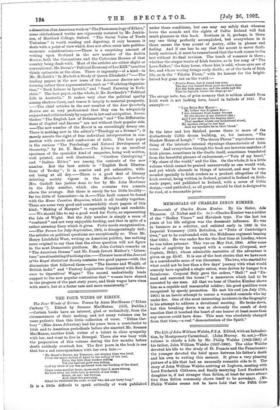T±Lti FOUR WINDS OF ELRINN.
The Four Winds of Eirinn. Poems by Anna MacManus ("Ethna Carbery "). Edited by Seumas MacManus. (Gill, Dublin.) —Certain books have an interest, glad or melancholy, from the circumstances of their making, and not many volumes can be more pathetic than this little collection of verse. "Ethna Car- bery" (Miss Anna Johnston) had for years been a contributor to Irish and to American periodicals before she married Mr. Seumas MacManus, another Irish writer of a talent in close sympathy with her, and went to live in Donegal. There she was busy with the preparation of this volume during the few months before death suddenly overtook her. The first poem in the book is one that has a sad correspondence with her own fate :— " My Heart's Desire, my Treasure, our wooing time was brief,
From the misty dawns of April to the fading of the leaf, From the first clear cuckoo calling Till the harvest gold was falling, And my store of joy was garnered with the binding of the sheaf.
There came another lover, more swift than I, more strong, lie bore away my little love in middle of her song; Silent, ah me I his wooing, And silent his pursuing,
Silent he stretched his arms to her who did not tarry long."
It is a little difficult to speak critically of work published under these conditions, but one may say safely that whoever loves the sounds and the sights of Celtic Ireland will find much pleasure in this book. Nowhere in it, perhaps, is there any one thing perfectly accomplished, but everywhere in it there occurs the true accent of poetry, alike in phrase. and feeling. And if one has to say that the accent is never fault- lessly sustained, it must be remembered that the work comes to the test without its final revision. The touch of romance is there; whether the singer treats of Irish fancies, as in her song of "The Love-Talker," the fairy lover, whose kiss is cold, whose eyes are of fire, and whose wooing brings early death ; or of the facts of Irish life, as in the " Paistin Fionn," with its lament for the bright- haired boy gone out on the world:— " Pciistin Fionn, but it vexed her sore,
The day you turned from your mother's door For the wide gray sea, and the strife and din That lie beyond, where the ships go in."
The savage note, too, of grim memory that is seldom absent from Irish work is not lacking here, heard in ballads of 1641. For example :—
" I am Brian Boy Magee— My father was Eoghain Ban—
I was wakened from happy dreams By the shouts of my startled clan ; And I saw through the leaping glare That marked where our homestead stood, My mother swing by her hair And my brothers lie in their blood."
In the later and less finished poems there is more of the distinctively Celtic dream building, as, for instance, " The Shadow House of Lough." "The Green Plover " reproduces some- thing of the intricate internal rhymings characteristic of Irish verse. And everywhere through the book are inwoven snatches of Irish phrase, sometimes in the Gaelic itself, sometimes translated from the beautiful phrases of endearment,—" Vein of my heart," "My share of the world," and the like. On the whole, it is a little volume which cannot be praised unreservedly as one would wish, and yet which abounds in things of interest, and may be com- mended specially to Irish readers as a product altogether of the Irish revival, being written in Ireland, printed in Ireland on Irish- made paper, and published in Ireland, with a cover of Celtic design,—and published, as all poetry should be that is designed to be read, at a reasonable price.






































 Previous page
Previous page